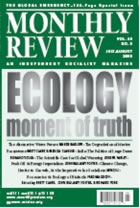climate change
Cooling a fevered planet: economics, policy and vision for fighting global warming
By Gar Lipow
July 1 2008 -- Nobody, except for a small lunatic fringe, still disputes that human-caused climate chaos endangers all of us. Further, most serious scientific and technical groups that have looked at the question have concluded that we have the technological capability today to replace greenhouse gas emitting fossil fuels with efficiency improvements and clean energy — usually at a maximum cost of around the current worldwide military budget, probably much less. The question therefore is: what's stopping us?
To answer that we need to look at the causes of global warming — not the physical causes, but the economic and political flaws in our system that have prevented solutions from being implemented long after the problem was known.
If socialism fails: the spectre of 21st century barbarism
July 27, 2008 -- From the first day it appeared online, Climate and Capitalism’s masthead has carried the slogan “Ecosocialism or Barbarism: there is no third way.” We’ve been quite clear that ecosocialism is not a new theory or brand of socialism — it is socialism with Marx’s important insights on ecology restored, socialism committed to the fight against ecological destruction. But why do we say that the alternative to ecosocialism is barbarism?
Marxists have used the word “barbarism” in various ways, but most often to describe actions or social conditions that are grossly inhumane, brutal, and violent. It is not a word we use lightly, because it implies not just bad behaviour but violations of the most important norms of human solidarity and civilised life. [1]
The slogan “Socialism or Barbarism” originated with the great German revolutionary socialist leader Rosa Luxemburg, who repeatedly raised it during World War I. It was a profound concept, one that has become ever more relevant as the years have passed.
The coming economic & environment meltdowns ... and the possibilities for fighting back
 July 15, 2008 --The
planet is facing a meltdown -- from the global financial system to the
unprecedented environmental crisis. Almost everyone from stockbrokers
to scientists to economists agree the situation is dire.
July 15, 2008 --The
planet is facing a meltdown -- from the global financial system to the
unprecedented environmental crisis. Almost everyone from stockbrokers
to scientists to economists agree the situation is dire.
Yet Wall Street banks are given hundred-million-dollar bailouts, while millions face home foreclosures. In the Third world it's worse -- crops are used to provide fuel for thirsty rich-world SUVs, while 100 million more people face starvation due to the growing food crisis. The disregard for the hardship of the majority has seen food riots and strikes hit over 30 countries.
Forests and climate change – examining the spin

By Susan Austin
Tasmania, Australia -- It’s easy to get confused about the issue of forests and climate change. Climate scientists say that preserving our forests is a quick, easy and cheap way to prevent further global warming, and Australia’s previous federal government allocated A$200 million towards preserving forests in South-East Asia. Yet both the federal government and the Tasmanian state government are overseeing the continuing destruction of Tasmania’s old-growth forests to feed a profitable wood-chip export industry and a soon-to-be-built pulp mill. And what’s more, they say that the industry is carbon-positive and sustainable. What’s really going on?
Ecology: The moment of truth—an introduction
By John Bellamy Foster, Brett Clark and Richard York
* * *

G8: Rich countries retreat from action on climate change
July 9, 2008 -- The G8's communique regarding their action on climate is actually inaction being masked as movement. It is a great fraud being perpetrated on the global community that would significantly reduce its capacity to contain climate change. We fully agree with the statement of the Government of South Africa that "[W]hile the Statement may appear as a movement forward, we are concerned that it may, in effect, be a regression from what is required to make a meaningful contribution to meeting the challenges of climate change." [Click pic for BBC footage of G8 protests.]
Retreat from Bali
Political activism, class struggle -- not markets -- will save the planet
July 5, 2008 -- A political economist and activist who directs the Centre for Civil Society at the University of KwaZulu-Natal in Durban, South Africa, Patrick Bond was a featured guest speaker at the Green Left Weekly Social Change — Climate Change conference held in Sydney, Australia, in April.
Author of a range of books, including Climate Change, Carbon Trading and Civil Society, Looting Africa: The Economics of Exploitation, and Walk Left, Talk Right: South Africa’s Frustrated Global Reforms, Bond is a long-time advocate for radical solutions to the climate and social catastrophe wraught by global capitalism.
Lauren Carroll Harris spoke to Bond at the conference about responses to climate change.
* * *
What has been the response of the market to the crisis of climate change and what role does carbon trading play?
Can carbon trading solve global warming?
Larry Lohmann, the Corner House, UK
Towards climate action in Copenhagen 2009
Climate Network 09 | 23.05.2008 23:39 | Climate Chaos | Ecology
We invite you to join the 1st international planning meeting in Copenhagen from
the 13-14th of September 2008. The meeting aims at preparing a large
mobilisation for direct action against the root causes of climate change in
Copenhagen and throughout the world during the UN Climate Conference (30 Nov-11
Dec 2009).
Towards climate action in Copenhagen 2009
First international planning meeting
We stand at a crossroads in history. The facts are undeniable. Global climate
change, caused by human activities, is happening. We all know that, world over,
we're facing a manifold and deepening crisis: of the climate, energy, food,
livelihoods, and of political and human rights. Scientific, environmental,
social and civil society movements from all over the world are calling for
action against climate change.
Massive consumption of fossil fuel is one of the major causes of global
warming, a problem that threatens the lives of hundreds of millions of people
Nationalise big oil, enemy of the planet and its people
By Dick Nichols
June 17, 2008 -- The latest surge in the spot price of crude oil (to US$139 a barrel—87.4 cents a litre) dramatises the urgent need for society to wean itself off “black gold”. The longer we remain hooked the greater the devastation both to our environment and to the living standards of billions, especially the poorest peoples of the planet.

The challenge is huge. The response must combine defence against the threat to livelihoods from price rises with a plan to restructure economies and ways of living so that oil-intensive production and transport becomes a thing of the past.
Scottish Socialist Party: Free public transport for all: travel doesn't have to cost the Earth
The Scottish Socialist Party’s campaign for free public transport is an ``audacious, eye-catching idea'' according to Douglas Fraser, political editor of The Herald newspaper.
In the Belgian city of Hasselt, which covers an area double the size of Dundee, congestion was eliminated in the late 1980s after the introduction of a totally free public transport system.
Free public transport would be the biggest single pro-environment policy enacted by any national government anywhere on the planet, dramatically slashing car use and CO2 emissions.
Free fares would represent a major shift of wealth in favour of the many thousands of people who currently pay sky-high fares to subsidise the transport companies.
Via Campesina farmers to heads of state: Time to change food policies!
Via Campesina
Rome, June 3, 2008 -- Now that the FAO expects that hunger will affect an extra 100 million people by the end of the year, heads of states and leaders from around the world are gathering in Rome for the FAO "High-Level Conference on World Food Security: the Challenges of Climate Change and Bioenergy".
The international peasant’s movement Via Campesina welcomes this sudden high level interest in food and agriculture production, but reminds governments and international institutions that the current climate and food crisis are not the result of any sudden natural disaster. They are the fruit of decades of policies of trade ``liberalisation'' and of the vertical integration of production, processing and distribution by corporate agriculture.
Therefore, governments today have to take full responsibility for the current crisis and take resolute actions to solve it.
